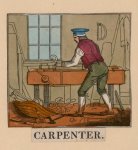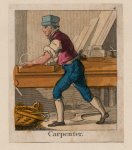Here's the tool shot that would have normally been at the end of the moulding shelves project post:

My idea was to divide the group into smaller, task based, sets. It's a good idea, but somewhat problematic, as reality is not quite that organized. For example, should the bevel gauge be included with "layout" tools or "dovetail" tools? I chose both. Of course, the sharp eyed reader will point out that the same bevel gauge is NOT included in the full tool group photograph. Hmm. I guess it's not that FULL after all...
I'm not really trying to do anything more than the grouping, but I will include a few notes here and there. Anyway, here's my attempt at an organized tool breakdown.
Layout Tool Set:

Framing square w/ Veritas square fence*, shop-made marking gauge, 6' zigzag rule, shop-made panel gauge, pencil**, marking knife, dividers w/ pencil**, bevel gauge, 6" square.
* I like this fence, but wish it was thin on both sides, so I could use it on 3/4 stock in left and right orientation.
** Dixon Ticonderoga 1388-2/HB Soft, of course!
Dimensioning Tool Set:

Stanley #65 low angle block plane, framing square w/ Veritas square fence, cross-cut panel saw*, rip saw, shop-made marking gauge, marking knife, 6' zigzag rule, 6" square.
* Being on the shorter side, I prefer shorter saws - especially for cross cutting. This one is 20" with 12tpi.
Dado Tool Set:

Maul*, framing square w/ Veritas square fence, 6' zigzag rule, 3/4" dado plane**, Gramercy holdfasts***, batten, hammer, marking knife, story stick****.
* Like a lot of my shop-made tools, this was a quick and dirty prototype that just kept working...
** An Ohio Tool Co. 3/4" dado plane that came to me with a sketchy replacement iron, which I reshaped and hardened, and now it works great (Thanks again Dave!).
*** I am just loving these! My old system worked fine, but these are slick and a joy to use. If you are considering buying a pair, do it!
**** This should have appeared in the layout set as well. I don't know why I don't always make one of these. It was very useful, and saved me from cutting a dado on the wrong side of a line more than once.
Shaping Tool Set:

6' zigzag rule, half-round file (fine), half-round file (coarse), shop-made turning saw, Veritas spokeshave (round), Veritas spokeshave (flat), dividers w/ pencil*.
* Dixon Ticonderoga 1388-2/HB Soft. Don't ask...
Rabbet Tool Set:

Maul, sneaky framing square*, flat bladed screw driver**, Record #778 rabbet plane***, Gramercy holdfasts, 6' zigzag rule.
* NOT used for this task - don't know how it made it into that shot without me noticing.
** The set screws on the 778 are slotted - using the screwdriver is slower, but much more secure. No wandering fence or depth gauge here!
*** Or rebate plane for any Brits who might be reading this. Go Cavendish!
Surfacing Tool Set:

Stanley #7 jointer plane, Stanley #5 jack plane, Stanley #3 smooth plane, Stanley #65 low angle block plane.
Dovetail Tool Set:

Coping saw, pencil*, Lie-Nielsen dovetail saw (rip), shop-made marking gauge**, bevel gauge, Marples chisel, marking knife.
* Do I have to say it again?
** Sharpened to a knife point.
Boring and Fastening Tool Set:

Millers Falls 6" brace*, phillips hex driver bit, hex driver adapter**, no-name egg beater drill***, twist bits, hammer, bit gauge, 6' zigzag rule.
* Smaller braces are great for driving screws - much faster rotation, but still plenty of power.
** Not really needed - the brace chuck can hold the hex driver on its own, but it's so stubby it is hard to see what's going on - the adapter improves visibility greatly.
*** With the c. 1976 price from Jim Klauder & Sons Country Hardware in my Dad's handwriting - not the best drill in my kit, but my favorite.
Well, I don't think I will be doing this for every project. It's too much work for one thing, and it would probably bore most readers to tears. It was kind of interesting as an exercise in classification - at least for me - but maybe I'm just strange that way...










"...maybe I'm just strange that way..."
ReplyDeleteYou are - that's why we love you, among other reasons.
Josh
I would suggest some 'cross-linking' between categories that overlap, such as bevel gauges. Select your optimum category. For related categories, simply draw an outline of the primary and insert a note directing yourself to where the tool is housed.
ReplyDeleteIt works for websites, why shouldn't it work for tool cabinets?
Gary
Josh - Takes one to know one! Back at you Bro.
ReplyDeleteGary - Good idea, but I haven't got that far yet - just organizing the tools for photos kept me busy. You want me to actually organize their storage? Yikes! :)
I was thinking along the lines of pressure sensitive switches. When you touch the image imbedded in the tool case, the actual hanging spot of the tool lights up. By doing this, you don't have to worry about buying duplicate tools to fill in cross-referenced gaps.
ReplyDeleteThere must be a Sears patent in this somehow...
Gary - What if we took things one step further, and instead of just showing you where the tool is located, it actually brought it to you! Like at the dry cleaners? Hmm...
ReplyDeleteMaybe this system, only instead of "customers" it would be "tasks" and "tools" instead of "garments". Yes! Scan in the code "dovetails" and the whole dovetail tool set is assembled AND delivered to the bench! With Martinizing! Awesome!
Forget Sears - we're going big time! I'm thinking infomercial!
No Joke this. There was a company that invented a robotic book retriever for libraries. The device was keyed to Dewey Decimal codes and could learn from it's mistakes. Of course it never was sold, but it was invented.
ReplyDelete